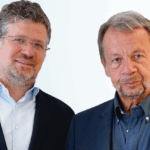
Online media in Switzerland: facts are stubborn, the masks are falling!
October 21, 2024
Leidar and legitima launch joint offering to strengthen corporate and institutional legitimacy (press release)
October 2, 2025The former Director General of SRG, Gilles Marchand, is leading a new research field on philanthropy and the media at the University of Geneva. As an additional source of funding, philanthropy is also gaining importance in the Swiss media landscape. This article, translated from German, originally appeared in Schweizer Journalist:in under the byline of Eva Hirschi.
Foundations supporting journalism—including in Switzerland—are increasingly common. The topic attracted particular attention last July with the launch of the Media Forward Fund, an initiative uniting ten organizations from Switzerland, Germany, and Austria. This fund brings together several million francs from various foundations, with the aim of strengthening journalism.
“It is now widely recognized, even outside the media world, that funding from the state or the market—that is, from readers and advertising—is no longer sufficient. And this financing crisis could ultimately threaten democracy. More and more foundations, organizations and benefactors are therefore investing financial resources in the media,” explains Gilles Marchand. Since March, the former SRG Director General has been heading the new Media and Philanthropy Initiative at the University of Geneva’s Center for Philanthropy. This initiative aims to take a closer look at philanthropic engagement in the media sector.
A critical look at funders
The goal of the Geneva center is not to seek new funding sources itself: “From our position, we are not looking for direct financing but want to spark interest in this subject and clarify the criteria for philanthropic engagement. It is important to us to offer a neutral, external perspective, thus contributing to democracy,” says Nicolas Duvoux, Director of the Center for Philanthropy. “In Switzerland, there are a great many foundations, and philanthropic actors play an essential role. They contribute to democratic vitality, support the associative fabric, encourage innovative initiatives, and strengthen the economic structure.”
Since 2017, the center has been studying philanthropy and related topics such as social entrepreneurship, foundation governance, and impact investing. To this end, it collaborates with major international philanthropic foundations such as the Rothschild Foundation, the Leenaards Foundation and Mercator. The new focus on media arose as part of the center’s work on interactions between philanthropy and democracy. “In North America, but also in Eastern Europe, we are seeing significant influence from philanthropic funding—sometimes coming from oligarchs with their own foundations. We want to gather and analyze all these experiences,” says Duvoux.
Among the well-known examples of influential foundations are the Bill & Melinda Gates Foundation and George Soros’s Open Society Foundation. The latter has around $22 billion in assets and, in 2021 alone, distributed approximately $1.5 billion to political figures, NGOs, and organizations around the world—including media outlets. This has also drawn criticism. The foundation’s aim is to promote freedom of expression, transparency, justice, and equality. At the same time, George Soros has faced accusations of wielding undue influence, even fueling conspiracy theories.
Not a replacement but a complement
Gilles Marchand, together with a team of postdoctoral researchers, will dedicate himself to exploring the relationship between philanthropy and the media. This will involve both scientific studies on media as a public good and a collection of concrete case studies of media outlets funded partially or entirely by philanthropic sources, particularly in North America and Europe. The University of Geneva is working in partnership with HEC Montréal business school. “In the United States, Canada, and Scandinavia in particular, philanthropy has long been part of the media funding model,” says Marchand.
The center will also accompany foundations wishing to support media. However, the idea is not for philanthropic means to become the media’s new business model, but rather to help them eventually become economically sustainable on their own. Media organizations, however, need time to adapt to this structural transformation. “Philanthropic funds can enable innovations and investments so that the media can reinvent themselves and find a new economic balance,” Marchand says.
Cantons as new players
Typically, foundations are the ones supporting media. In Switzerland, a newspaper was even acquired by a foundation for the first time in 2020: the French-speaking daily Le Temps was taken over by Aventinus, backed by the Wilsdorf Foundation, the Jan Michalski Foundation, the Leenaards Foundation, and Geneva-based benefactors. “The Aventinus Foundation paved the way. This happened at a decisive moment—otherwise, Le Temps might not even exist today,” according to Marchand.
From his perspective, cantons could also become interesting philanthropic actors in Switzerland. Several French-speaking cantons have already provided funds to support media outlets. Their approaches, however, vary widely. “For the cantons, as for other actors, the question of independence is essential. This is an area where we want to contribute,” says Marchand.
Concretely, the center intends not only to conduct research but also to develop tools and processes, particularly in the fields of governance and sustainable financing. “We specifically want to draw up a charter setting out rules for good governance—not only for foundations but also for media outlets—to ensure they remain independent,” Marchand says. Only in this way, he argues, can trust in the media be rebuilt.
Companies also have a role
But philanthropic support for media can also come from wealthy individuals, organizations, or companies—even banks, Marchand notes: “In principle, this concerns all funders who are not seeking a high return on their capital.” Journafonds, a fund supporting investigative journalism in Switzerland, has in the past received occasional donations of CHF 10,000 each from Swiss Post and Google. But it is still very difficult to motivate Swiss companies to offer support, explains its Secretary-General Jean François Tanda: “As corporate citizens—which companies are—we would like to see broader support for journalism and therefore for democracy, especially as part of their social responsibility.”
For Gilles Marchand, this could change: “Even large corporations are realizing that a functioning media system is in their interest.” He does not see philanthropic funding as a passing trend: “The quality and diversity of media are an essential pillar of a well-functioning democratic society. Switzerland, in particular, with its linguistic and cultural diversity, needs a varied media landscape,” he says. “New forms of funding are therefore essential.”


